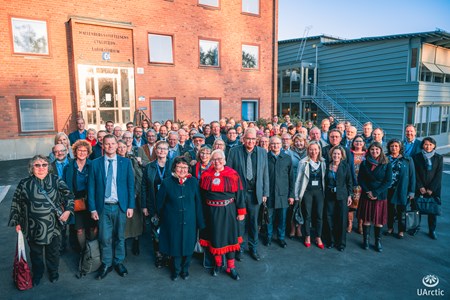Stockholm University's Elisabet Idermark greeting participants: "It has been great to welcome everyone to Stockholm for this key meeting in UArctic's history - the last meeting of the Council before the transition of our organization."
The key decision of this year's Council meeting was the move to change UArctic's legal status to a registered non-profit association. This change will help undertake fundraising initiatives for the development of existing network activities as well as the creation of new ones. As a consequence of this decision, the Council will be known as the Assembly.
Chair of the Council, Liisa Holmberg of the International Sámi Film Institute, sees these developments as "strengthening UArctic's role as a bridge between people, higher education, research and business in the Arctic. UArctic provides a platform for innovation and creating a great environment for sustainable development."
The Council also made substantial contributions to the development of the organization's next Strategic Plan, which will focus UArctic's operations over the next decade and strengthen the network's position as the key driver of circumpolar research and education.
UArctic President Lars Kullerud remarks, "The change to the legal status together with our next Strategic Plan puts UArctic on a strong footing to continue our mission of improving the lives and livelihoods of northerners through research and education that is relevant to their needs, in a true partnership."
The annual Council meeting of UArctic is an opportunity for representatives of all our member organizations to shape the future of the network, and forge closer cooperation through our various programs including Thematic Networks, north2north student mobility, joint academic offerings and research initiatives that benefit the North on its own terms.
The energy proved by UArctic members in a series of networking sessions demonstrates how we can learn and grow from our collective experience of developing and delivering higher education and research in and for the Circumpolar North. This is essential to direct our future development, while also helping new members better understand how they can actively participate in UArctic cooperation.
UArctic welcomed 11 new members to the network, bringing UArctic's total membership to 212:
- Agricultural University of Iceland (Iceland)
- Alaska Pacific University (USA)
- Hólar University College (Iceland)
- Norwegian University of Life Sciences (Norway)
- University College Copenhagen (Denmark)
- University of New Hampshire (USA)
- University of Southern Maine (USA)
- Anchorage Museum (USA)
- ARCTICenter - University of Northern Iowa (USA)
- Battelle (USA)
- National Centre for Polar and Ocean Research (India)
The Council also welcomed three new Thematic Networks to UArctic:
- Thematic Network on Arctic in Asia and Asia in the Arctic (led by UiT The Arctic University of Norway)
- Thematic Network on Collaborative Resource Management (led by Nordisk Fond for Miljø og Udvikling, Denmark/Greenland)
- Thematic Network on Local-scale Planning, Climate Change and Resilience (led by the University of Alberta)
The UArctic Assembly will normally meet between April and July each year. However, a meeting of the Assembly will need to be held as early as possible in 2020 for members to make important decisions, such as formally elect the Officers of the Assembly, the Board Chair and other members of the Board.
Photos from the meeting are available at https://cutt.ly/uarctic

The University of the Arctic (UArctic) is a cooperative network of universities, colleges, research institutes and other organizations concerned with education and research in and about the North. UArctic builds and strengthens collective resources and collaborative infrastructure that enables member institutions to better serve their constituents and their regions. Through cooperation in education, research and outreach we enhance human capacity in the North, promote viable communities and sustainable economies, and forge global partnerships.
